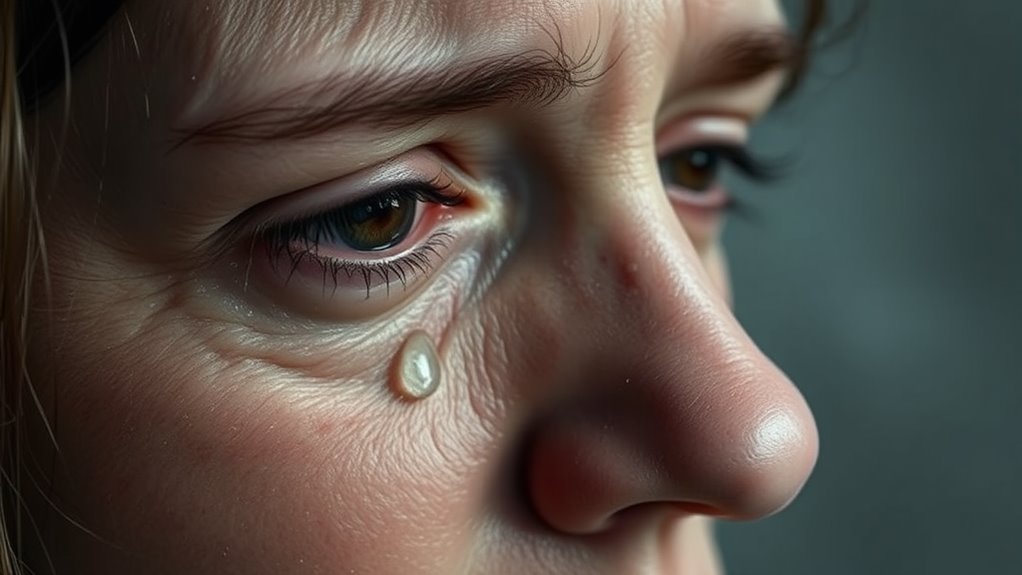How to Know If Your Skin Is Reacting to Stress
Your skin may be reacting to stress if you notice increased acne, dryness, or flare-ups of eczema or psoriasis. Other symptoms include redness, irritation, and signs of premature aging, like dullness or fine lines. Stress can weaken your skin barrier and prompt unhealthy behaviors that worsen these conditions. Monitoring your skin’s response during stressful times can help you identify triggers and manage reactions effectively. There are more strategies to explore for maintaining skin health amid stress.
Key Takeaways
- Monitor for increased acne, dryness, or flare-ups of eczema and psoriasis during stressful periods.
- Look for signs of redness and irritation, indicating inflammation linked to stress.
- Keep track of changes in your skin’s texture or appearance, which may signal stress reactions.
- Note any worsening of skin conditions coinciding with high-stress events or lifestyle changes.
- Maintain a journal to correlate stress levels with skin symptoms for better understanding.
Common Skin Symptoms of Stress
When stress takes a toll on your body, your skin often reflects those changes in noticeable ways. You might observe common stress skin signs, such as increased acne, dryness, or heightened sensitivity.
Stress can trigger hormonal fluctuations that lead to breakouts, especially in adults prone to acne. Dryness may occur due to cortisol production, which can impair your skin’s barrier function.
Furthermore, you could experience conditions like eczema or psoriasis flaring up under stress, as the immune response becomes compromised. Additionally, stress can lead to premature aging signs, like fine lines and dullness, as blood flow to the skin decreases. Managing stress effectively is vital for mitigating these skin issues and promoting overall skin health.
Recognizing these symptoms is crucial for managing stress and maintaining skin health effectively.
Understanding the Connection Between Stress and Skin
Stress impacts your skin on multiple levels, linking emotional states to physical manifestations. When you experience stress, your body releases cortisol, which can lead to increased oil production and exacerbate conditions like acne or eczema.
Additionally, stress may trigger inflammation, causing redness and irritation. The skin’s barrier function can weaken, making it more susceptible to external aggressors, resulting in dryness and sensitivity.
Furthermore, stress-induced behaviors, such as poor sleep or unhealthy eating, can compound these effects, ultimately impacting your skin’s overall appearance and health. Recognizing skin stress symptoms is crucial for implementing effective management strategies.
Understanding this connection allows you to recognize the importance of managing stress to maintain optimal skin condition. By addressing stress holistically, you can promote both emotional well-being and skin vitality.
Identifying Stress Triggers for Your Skin
Understanding the specific triggers that lead to skin reactions is essential for effective management.
Begin by monitoring your emotional and physical responses during high-stress periods. Note any changes in your environment, such as exposure to allergens or irritants, which can exacerbate skin issues.
Pay attention to your diet; certain foods may trigger inflammation or sensitivity. Additionally, assess your sleep patterns, as inadequate rest can contribute to skin distress.
Keep a detailed journal that tracks your skin’s condition alongside stress levels, environmental factors, and lifestyle choices. Identifying these connections empowers you to pinpoint specific stressors, enhancing your ability to preemptively address potential skin reactions before they escalate into more significant issues. Incorporating soothing ingredients into your skincare routine can also help mitigate the effects of stress on your skin.
Tips for Managing Stress-Induced Skin Reactions
Managing stress-induced skin reactions requires a proactive approach that addresses both the skin’s needs and the underlying stressors.
To effectively manage these reactions, consider the following strategies:
-
Establish a consistent skincare routine****: Use gentle, hydrating products tailored to your skin type to minimize irritation.
-
Practice relaxation techniques****: Incorporate mindfulness, meditation, or yoga to reduce overall stress levels.
-
Maintain a balanced diet****: Consume nutrient-rich foods that support skin health, such as fruits, vegetables, and omega-3 fatty acids.
-
Stay hydrated: Drink adequate water daily to keep your skin hydrated and resilient against stress-induced changes.
-
Recognize sensitive skin symptoms: Being aware of how stress can trigger reactions like redness, itching, or burning can help you take timely action.
When to Seek Professional Help for Skin Issues
Have you noticed persistent skin issues that don’t improve with home remedies?
It’s crucial to seek professional help if you experience symptoms like severe itching, swelling, or redness that lasts more than a few days.
Additionally, if you notice sudden changes in your skin texture, such as unexplained lumps or lesions, it’s time to consult a dermatologist.
Other red flags include pain, discharge, or any signs of infection.
If your skin condition significantly affects your quality of life or mental well-being, don’t hesitate to reach out for expert advice.
A healthcare professional can provide accurate diagnoses, recommend appropriate treatments, and assist in managing stress-related skin reactions effectively, ensuring you regain healthy skin. Persistent breakouts can often be linked to underlying issues that require professional intervention.




